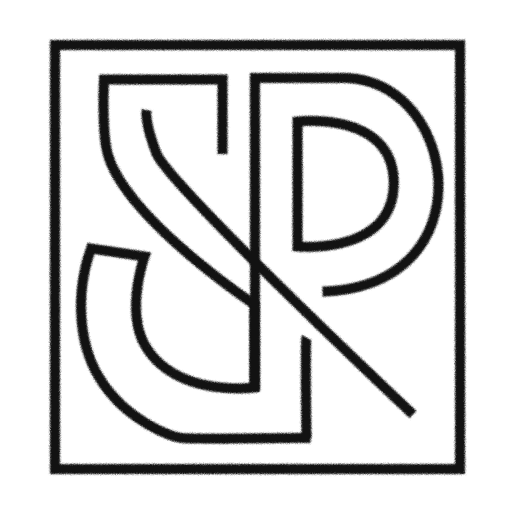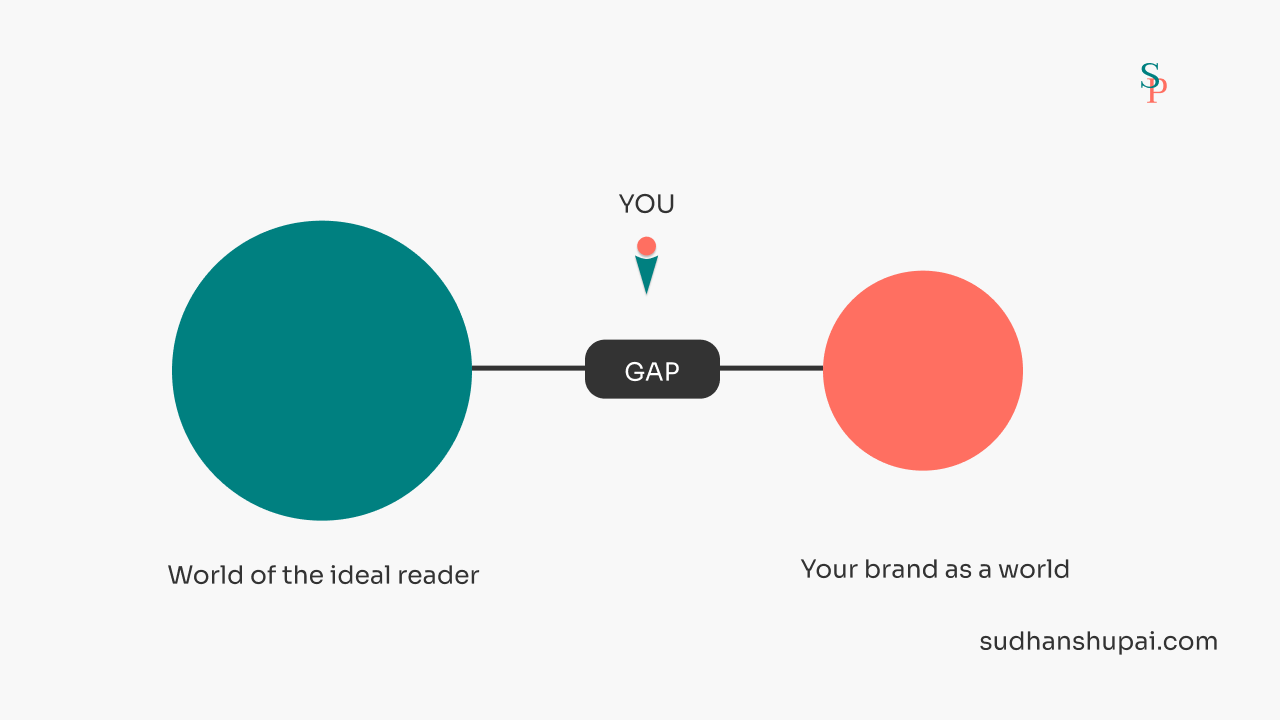De-risk your solo business
We live in a time when businesses built on personal brands are the norm.
The kind that goes “Pick a niche, pick an audience, learn about them, and solve their problem.”
But this traditional approach is outdated. The truth is, that personal brands built on this approach will be at a risk of turning into a commodity and trap you in an unescapable maze.
Just imagine, what would happen if you were to fall sick and your business is totally dependent on you.
In this essay, I’ll give you 3 reasons why I think so, and 3 ways to de-risk your solo business (cause I’ve felt the brunt after shutting down a writing business.)
Feel free to jump around if is saves you time.
Let’s get into it ↓
What happens when you build your business around your brand?
3 years and $2000 MRR later… I shut my writing business down.
I had everything any freelancer/solo business could dream of – Happy Clients, Good leads, Busy Calendar.
But there was a flaw in my plan.
I forgot to account for major mental health issues, that eventually caught up to my business and finally ended up me burning out in April 2023.
Due to this error and due to the fact that my business relied on my personal brand, my service business faced heavy losses.
All because
- My health
- Time zone control
- Not being able to fulfill the demands
did not sync up.
My problems became the brand’s problems, and the brand’s problems became the business’s performance problems.
And It gave birth to a vicious cycle that led to my downfall.
So just ask yourself, if you were to step away from your business due to some reasons, how badly would that affect your brand and business?
If you can’t think it through, here’s a few reasons.
3 Primary reasons to care
Most people build businesses for 2 reasons, it’s either to stroke the Good Samaritan in themselves or to Chase Freedom.
8 times out of 10 it’s the latter one.
That’s true and all, but the problem here is, that solo business owners forget to make that freedom sustainable. and over time they lose that freedom.
1. Loss of “Personal”
My case was menial, but this has been seen happening a lot more lately.
But in a tweet by Sam Ocean about observations in Creators, he said this:
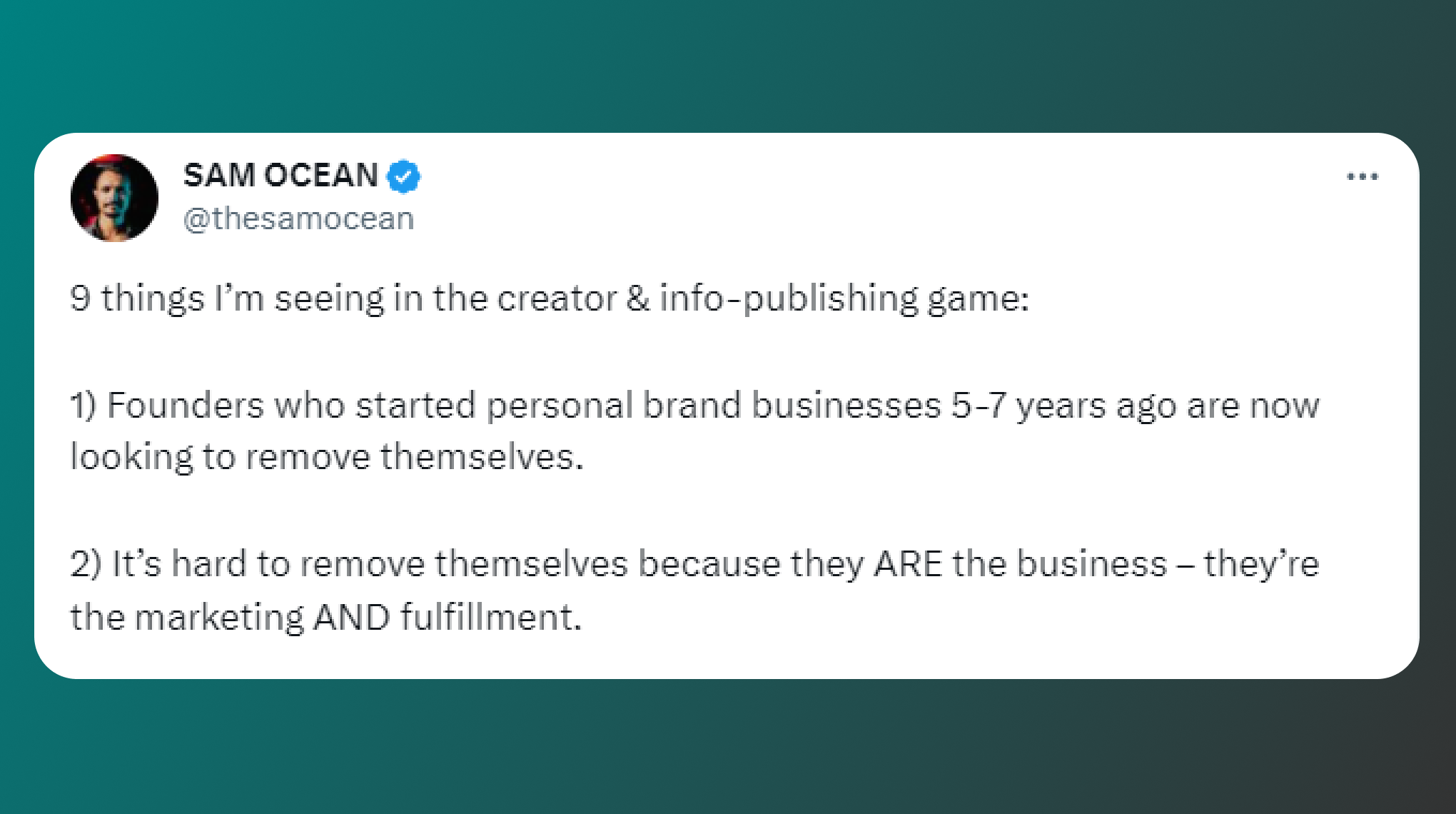
1) Founders who started personal brand businesses 5-7 years ago are now looking to remove themselves.
Tweet by Sam Ocean
2) It’s hard to remove themselves because they ARE the business – they’re the marketing AND fulfillment.
Which to me means, their personal brand, their “true” self gets lost. It just ends up being a “brand”.
2. Risk of Bullseye
Most of us who build a personal brand online go at it with a goal to build a business. And in doing so we end up taking the “general” advice: BE SPECIFIC TO DIFFERENTIATE YOURSELF.
I’m sure you’ve seen these Twitter bios:
1. I build landing pages for SaaS companies or
2. I help tech founders build a brand by ghostwriting their newsletter or
3. I run a baking service that supplies goods to Web3 Events.
There’s near endless possible combinations and it’s a valuable strategy but… after spending months and years getting known in a field, it is pretty hard to break the mold and explore other domains.
If you are not strategic, you end up spreading yourself too thin.
The first word in the phrase, “personal brand” is “personal.” Now add an “ity” to it, drop the “brand” and that’s what it really means. That’s the secret.
Adam Ritchie
3. The Honesty trap
“Your personal brand personality, is your business personality”
Do you see the problem here?
Let’s say you messed up your content for some reason (GOD FORBID), and it turns into something “not so desirable and misaligned” with your intended values, but you were being honest to yourself. Just think how bad it would affect your business.
You’ve probably seen this on September 7, 2018, when Elon went on Joe Rogan Experience and was having a “good time” and over the next couple of days STOCK took a hit.
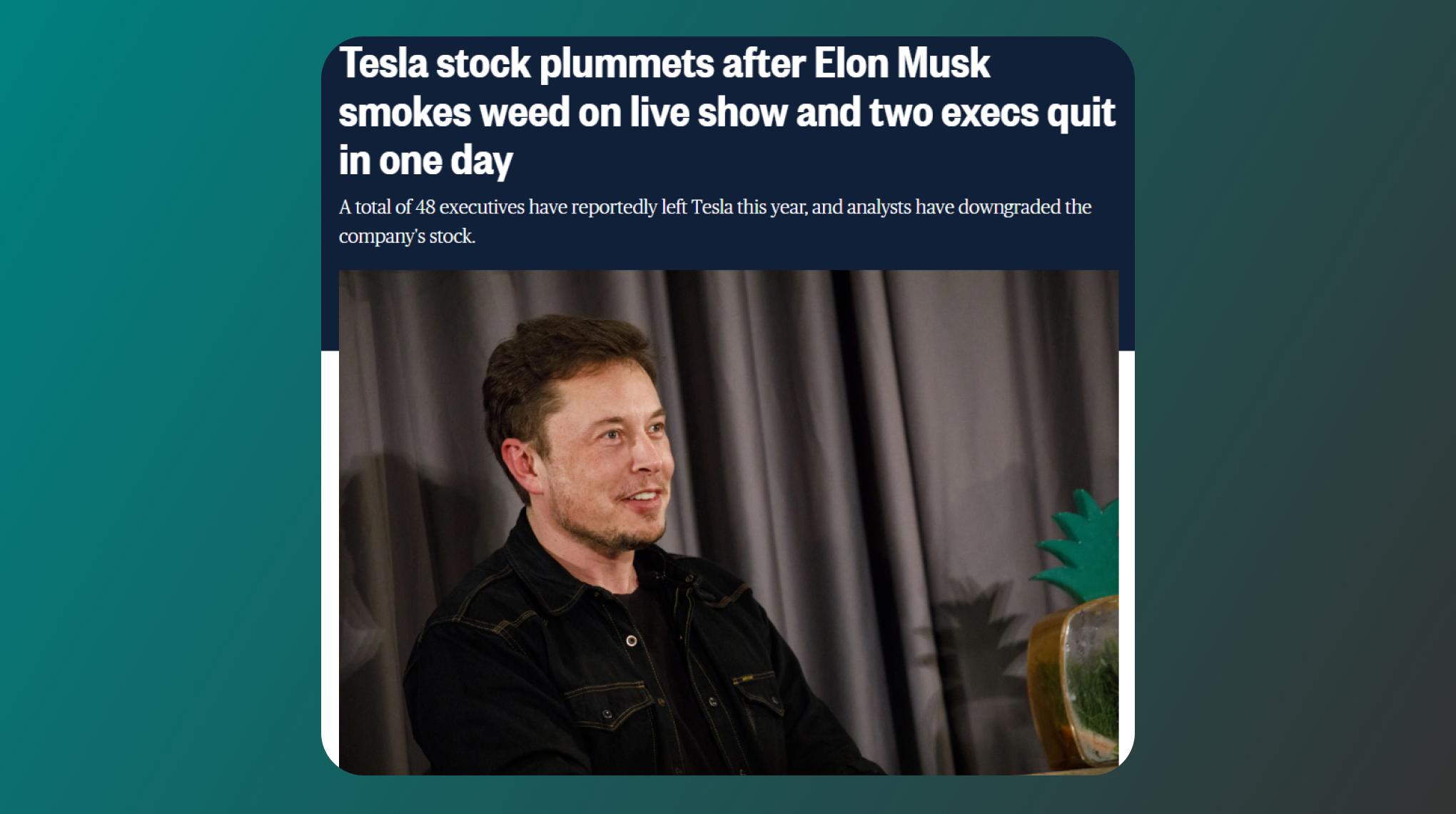
This happened to a genius, who has not built a business around his personal brand and still took the brunt of it on a catastrophic scale.
And all he did was be Honest.
Now scale it down to a solo creator’s POV, what would happen if you just fell sick and decided to take a break?
You’ll get hit in both business and brand.
I know, I’ve taken that hit already.
You can’t just keep pretending to be okay when you clearly are not. You’ll end up being a fabricated construct on the internet, and people can smell that from miles away.
All that said, there are still ways to work around the conundrum. A brand is still a high ROI asset for Creators, Founders, and Entrepreneurs alike.
Call it a necessity if you will.
But there are ways to de-risk your creator’s business.
3 ways to de-risk your solo business.
I like referring to this “THE WONDERLAND” Philosophy.
People are able to do that with good content, giveaways and whatnot.
But once they get what they want, they’ll end up ignoring you or unfollowing you, or unsubscribing from your list.
It’s the “Making them stay part” that most people suck at. And end up having a low-quality audience.
Here are the 3 things you can do to de-risk your solo business and still build a sustainable solo-creator business and use this philosophy.
1. Create an Ecosystem of Assets
Let’s say you have a service business (pretty common as a new creator, right?)
The standard sales funnel goes:

There’s 3 things wrong with this
- It makes things overly dependent on you (as it did for me)
- Your brand becomes a commodity, instead of an asset
- If you shut down, your income shuts down
This is not a WIN-WIN situation.
To make it a WIN-WIN situation, you need to build them a world.
Daniel Priestly says in Key Person of Influence:
“You need to have them play an interesting game while participating in it. Show them the value of mundane things.
Daniel Priestly, Key Person on Influence
Like: Steve Jobs – personal computer in hand, Elon Musk – Electric Vehicle”
Both of them have built a world around this idea, and have invited people into it to participate with them.
It has to be fun, must have rules, needs players, prizes, ways to win & ways to lose.
Like Dungeons and Dragons or MONOPOLY.
A place where you are allowed to be honest, your readers are allowed to be the way they want, chase what they want to chase and build what they wish to build while adhering to some rules.
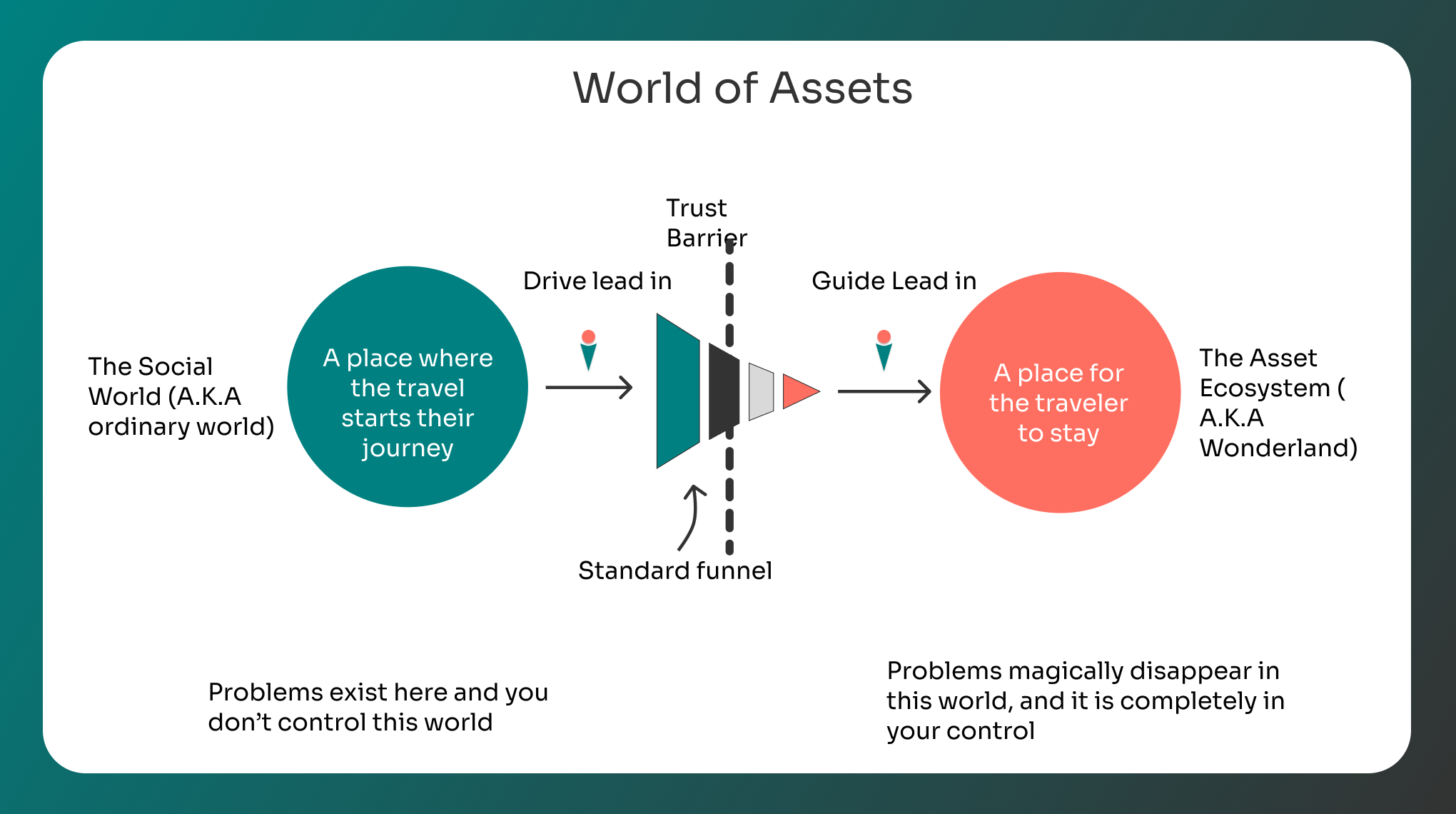
A place where every possible problem you are interested in and your reader is interested in is solved by
- Your ideas
- Your offers
- Someone else’s ideas
- Other people of your tribe
- Other people’s assets
All you really do is act as the person who points their finger in the direction of value.
Only then it will become a never-dying flywheel that can run without you being completely involved in it.
2. Setup Complimentary offers
Have one easy flexible offer in your arsenal, cause there are people who follow you, and who have invested time in your journey… they should also get something from you as a GIFT.
How do you do that?
Let’s say you are an email marketer, who targets whatever ICP you do. You’ve got good enough results with the open rates, landing page conversion… and whatnot.
Coincidentally, there is a chunk of your tribe that’s been trying to write a landing page for themselves, for their product…
You could just help them with their work via a mini-video course, checklist or group consult call.
This is just at the top of my head though.
THESE ARE NOT LEAD MAGNETS so don’t make them out to be the 1st step of the rest of your core offer or something.
These are meant to be offers that are of adjacent skills that you got good at besides your core offer.
It has to be a complete solution.
3. Switch to flywheels
Setting up funnels is great, everybody makes them. But there is a problem with funnels…
THEY ARE FUNNELS.
They are open at both ends – Water in, Water out.
And if you want new leads, you’ll have to keep working on new content and experiences to keep them coming in.
That is not a situation you can keep doing if you are on your own.
Flywheels on the other hand is a different setup where you take your readers/followers through a virtuous cycle that turns your readers into a promoter by reducing friction between sales & marketing.
Here’s 3 of my favorite examples:
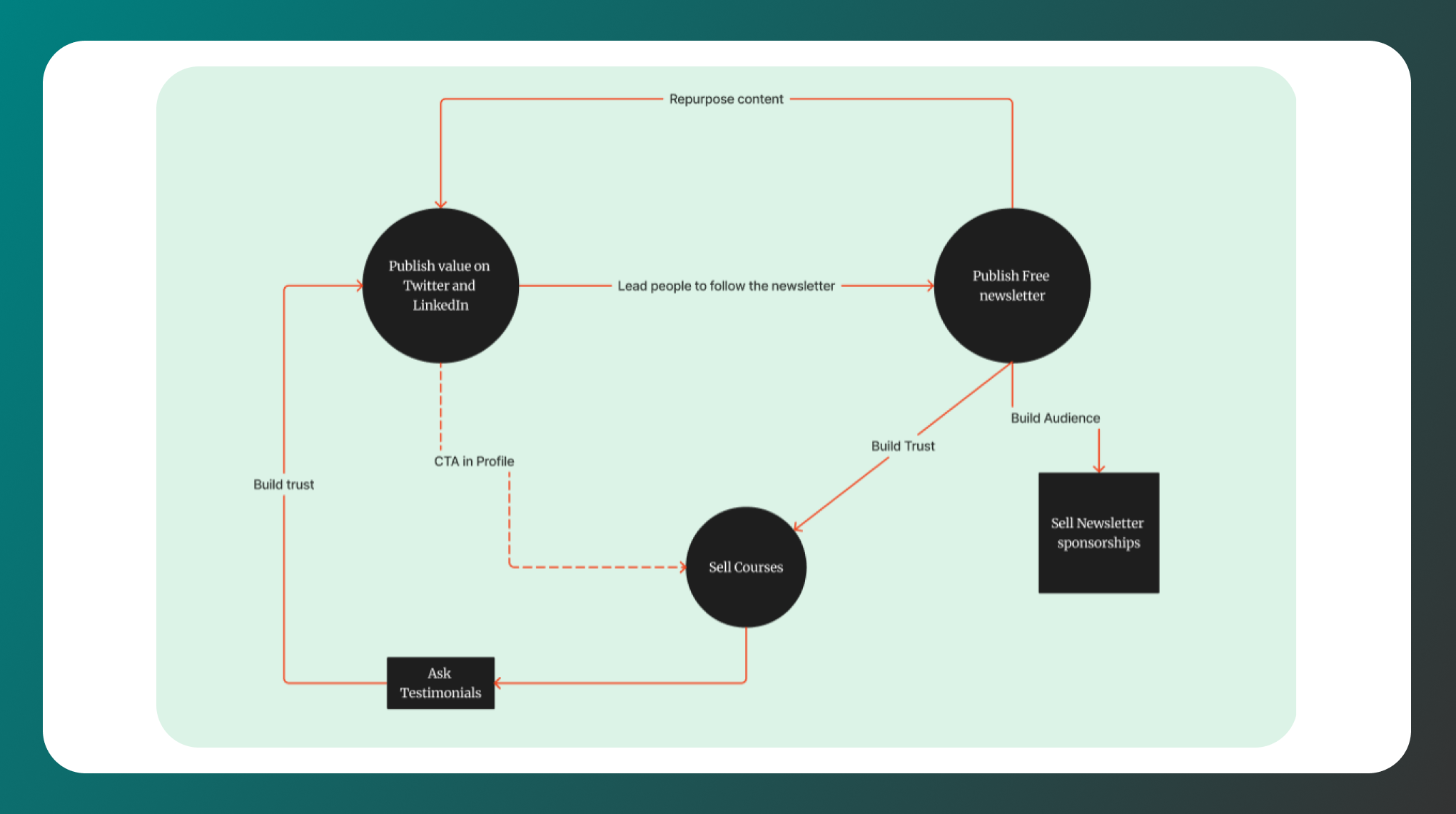

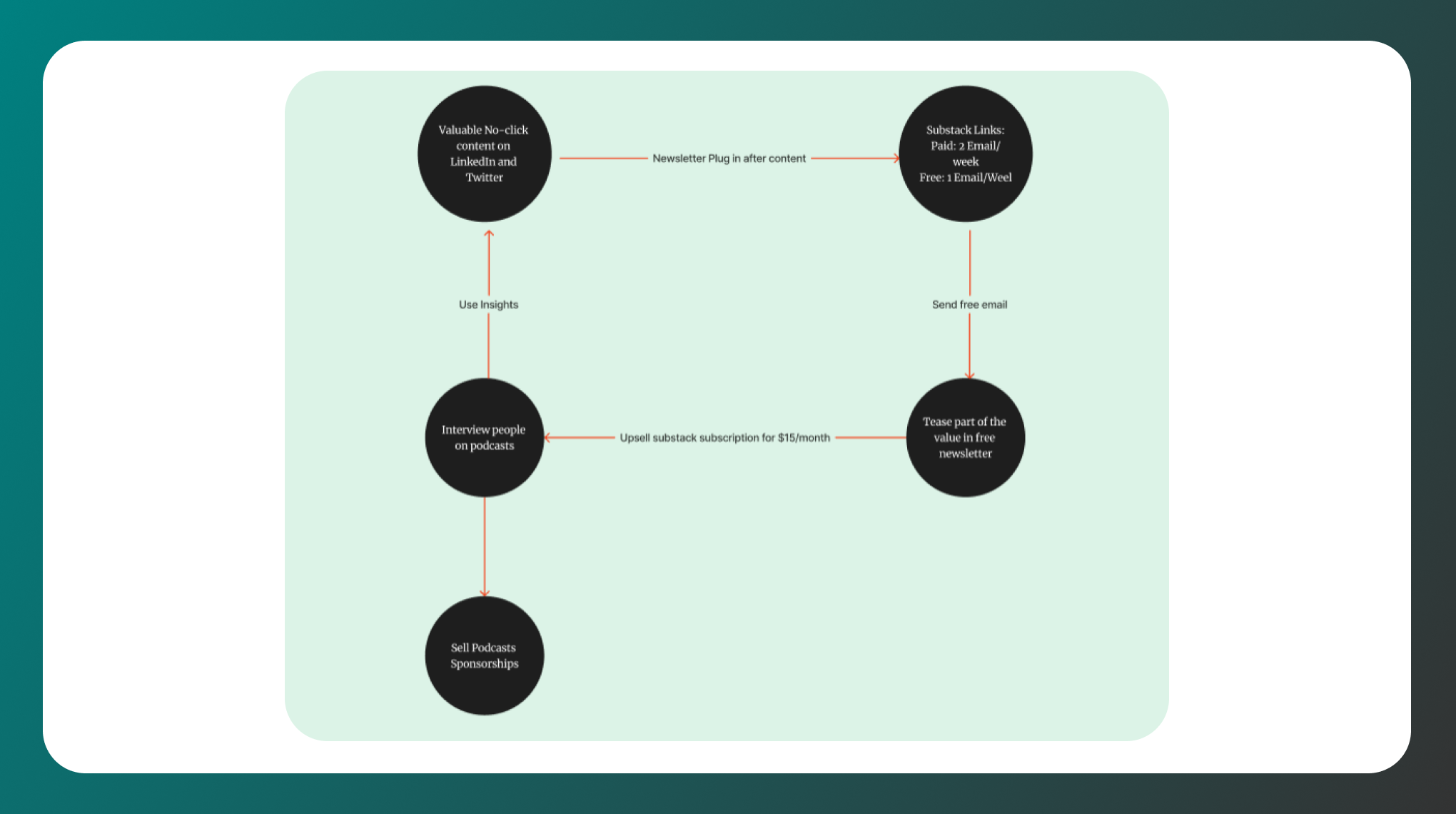
You can see all these in action on their social handles.
By optimizing your system for the reader, makes it much more efficient to promote your content and give delight to the reader.
Similarly, you can turn 1 piece of content into almost 15 pieces to bring readers back to the source of your message, if done right!
Setting up Flywheels eliminates resistance and gives you a whole lot of time to work on stuff that is actually going to matter.
Key Takeaway
Build your wonderland.
Don’t build a brand, build a world around an idea and create a virtuous cycle that invites people to stay and play the game with you.
That is the only way you can build a brand and a business that will grow without you being overly involved in it.
